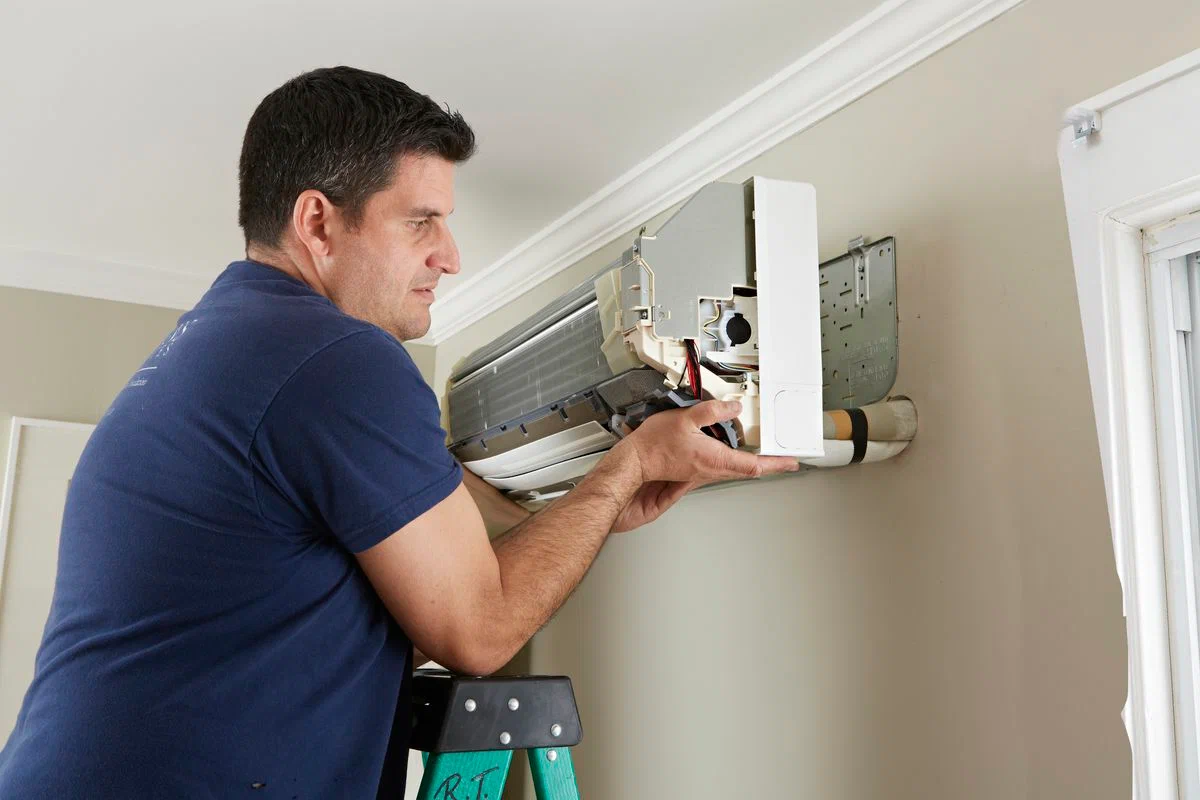
When the summer heat hits, having a reliable air conditioning system is crucial to maintaining comfort in your home or office. The key to ensuring optimal performance and longevity of your system begins with professional air conditioner installation. Whether you’re upgrading an old unit or installing a new system in a newly constructed space, expert installation is essential for efficient cooling and energy savings.
In this article, we’ll walk you through why professional air conditioner installation matters, the installation process, factors to consider, and how to choose the right air conditioning system for your home or office. We’ll also discuss how to find the best professionals for the job.
Why Professional Air Conditioner Installation Matters
Air conditioners are complex systems that require precise installation to function correctly. Improper installation can lead to a range of issues, from poor cooling performance to higher energy bills and even premature system failure. Here are some key reasons why opting for professional air conditioner installation is a wise decision:
1. Efficiency and Performance
A professional installation ensures your system operates at peak efficiency. If the unit is not sized correctly for your space, or if it’s not installed properly, it could lead to inefficient cooling, higher energy consumption, and a shorter lifespan for the equipment.
2. Manufacturer’s Warranty
Many manufacturers require professional installation to maintain the warranty. If an unlicensed or unqualified installer sets up your air conditioner, you may void the warranty, leaving you responsible for costly repairs.
3. Safety Concerns
Installing an air conditioner involves electrical work and handling refrigerants, which can be dangerous if not done correctly. Professional installers have the knowledge and certifications to safely manage these components, reducing the risk of electrical fires, gas leaks, and system malfunctions.
4. Peace of Mind
Knowing that your system was installed by experienced professionals gives you peace of mind. You won’t have to worry about leaks, faulty wiring, or poor system performance. A trusted installer will also provide maintenance tips to keep your system running smoothly.
The Air Conditioner Installation Process
The installation process involves several key steps, each of which requires careful attention to detail. Here’s what you can expect when scheduling professional air conditioner installation:
1. Site Assessment
Before any installation begins, a professional technician will visit your home or office to assess your space. Factors like the size of your room, insulation, sunlight exposure, and room layout all influence the choice of air conditioner. The technician will ensure that the unit you choose is appropriately sized for the area to ensure maximum cooling efficiency.
2. Choosing the Right Air Conditioning Unit
Choosing the right type of air conditioning system is crucial for both comfort and efficiency. There are different types of air conditioners, including central AC units, ductless mini-split systems, window units, and portable units. A professional installer will help you select the unit that best fits your needs, budget, and space.
3. Preparing the Installation Site
Once the appropriate system is selected, the technician will prepare the installation site. This may involve:
- Installing a mounting bracket: For wall-mounted units like ductless mini-split systems, a mounting bracket will be securely fixed to the wall.
- Placing the outdoor unit: For central AC units, the outdoor condenser unit will be placed on a sturdy surface like a concrete slab or a metal frame.
- Setting up electrical connections: The installer will ensure the proper electrical connections are made and that the system is grounded to prevent electrical hazards.
4. Installing the System
After the site is prepared, the air conditioner will be installed. For central AC systems, this may involve connecting the air handler to your existing ductwork. For ductless systems, refrigerant lines, condensate pipes, and wiring will be run between the indoor and outdoor units. The professional will ensure everything is properly sealed, insulated, and positioned for optimal airflow.
5. Testing the System
Once installation is complete, the technician will test the system to ensure it’s functioning correctly. This includes:
- Checking refrigerant levels
- Testing the thermostat
- Inspecting airflow
- Ensuring there are no leaks
The technician will also test the system’s performance by running the AC for a short period, adjusting the settings, and monitoring for any unusual noises or behavior.
6. Final Walkthrough and Maintenance Tips
After the installation is complete and everything is tested, the technician will walk you through the system’s features and settings. They will also provide you with maintenance tips, such as how to clean the filters, schedule regular maintenance, and check for issues before they become serious.
Factors to Consider When Choosing an Air Conditioning System
Choosing the right air conditioner for your home or office is essential for ensuring long-term comfort and efficiency. Here are some factors to consider:
1. Size of the Space
The size of the space you need to cool will significantly impact the type of system you choose. Air conditioners are measured in BTUs (British Thermal Units), which reflect their cooling capacity. A professional installer will calculate the required BTUs based on factors like the size of the room, the number of windows, and the level of insulation.
2. Energy Efficiency
Energy-efficient models can help you save money in the long run by reducing your energy bills. Look for units with high SEER (Seasonal Energy Efficiency Ratio) ratings. Additionally, consider ENERGY STAR-certified systems, which meet strict energy efficiency standards.
3. Ductwork and Installation Type
If you already have existing ductwork, a central AC system may be the most convenient and cost-effective option. If you don’t have ducts or prefer a more flexible solution, a ductless mini-split system could be the best choice. This system can cool individual rooms without the need for ducts, making it ideal for homes without existing ductwork or spaces that require zoned cooling.
4. Noise Levels
Different air conditioning systems produce varying levels of noise. If you need a quieter environment, look for models designed with noise reduction in mind. Ductless mini-splits are typically quieter than central AC systems, which is important for bedrooms, offices, or quiet areas
How to Choose the Right Air Conditioner Installation Professional
Choosing the right air conditioner installation service is just as important as choosing the right unit. Here’s what to look for in an HVAC professional:
1. Experience and Expertise
Choose a company with a proven track record of successful installations. Look for technicians who are licensed and certified to handle air conditioning systems. Experienced installers will ensure your unit is set up correctly, maximizing its lifespan and efficiency.
2. Reputation
Check online reviews and testimonials from previous customers. Positive feedback is a good indicator that the company provides high-quality service. You can also ask for referrals from friends or family members who have recently had air conditioners installed.
3. Pricing Transparency
Ensure that the installation company provides upfront pricing, including both labor and equipment costs. Avoid companies that offer vague or misleading pricing.
4. Warranty and Maintenance Services
A reputable installer will offer a warranty on both the installation and the system. They should also provide ongoing maintenance services to ensure your air conditioner runs smoothly for years.
Conclusion
Professional air conditioner installation is a crucial step in ensuring the comfort and efficiency of your home or office. With expert installation, you’ll enjoy improved performance, energy savings, and a longer lifespan for your system. Whether you’re installing a central AC system, a ductless mini-split, or any other type of air conditioner, choosing the right professionals to handle the job will ensure your cooling needs are met for years to come.
Remember to consider factors like the size of the space, energy efficiency, and budget when choosing the best system for your needs. A licensed HVAC technician will help guide you through the selection process and provide expert installation that will have your air conditioner running smoothly in no time.






